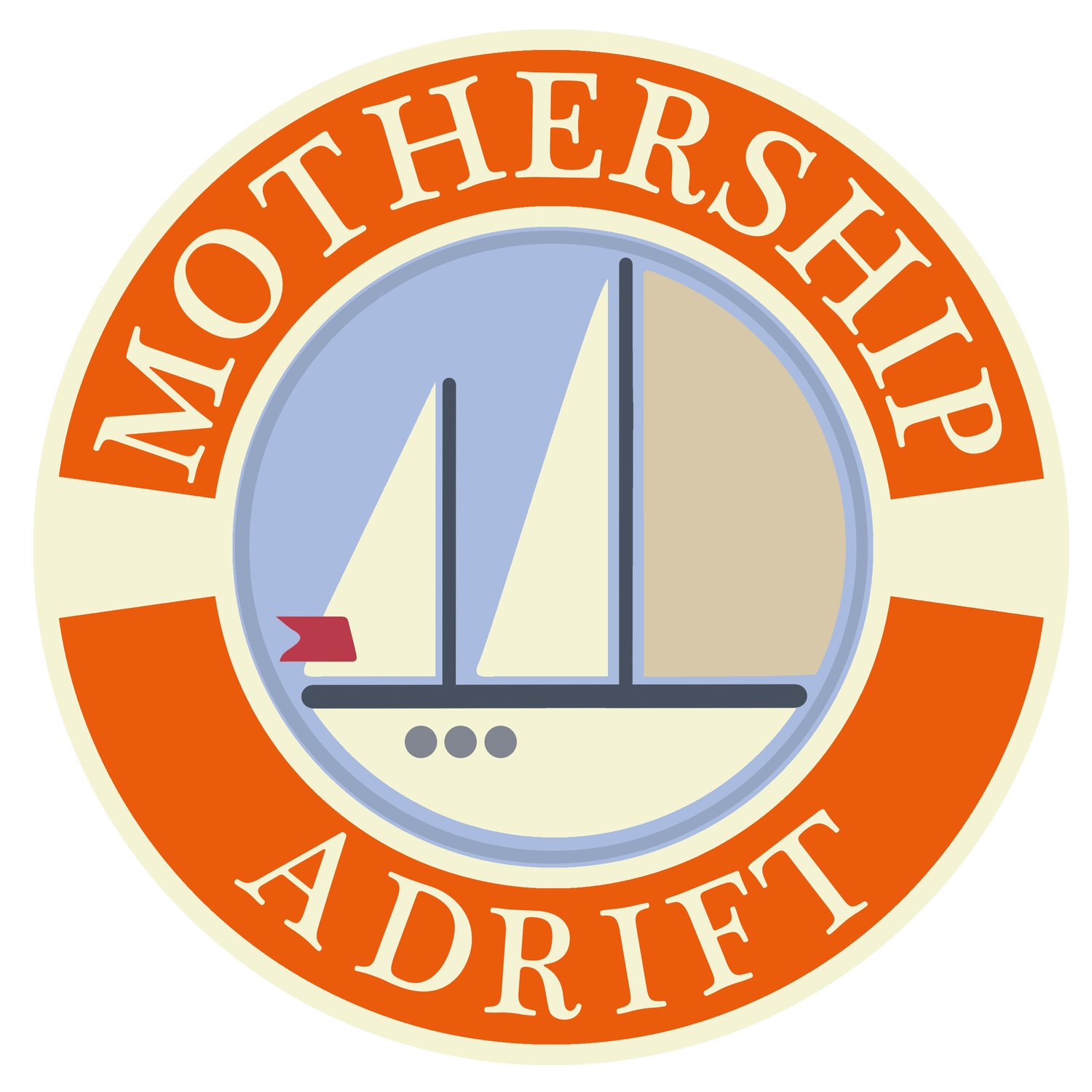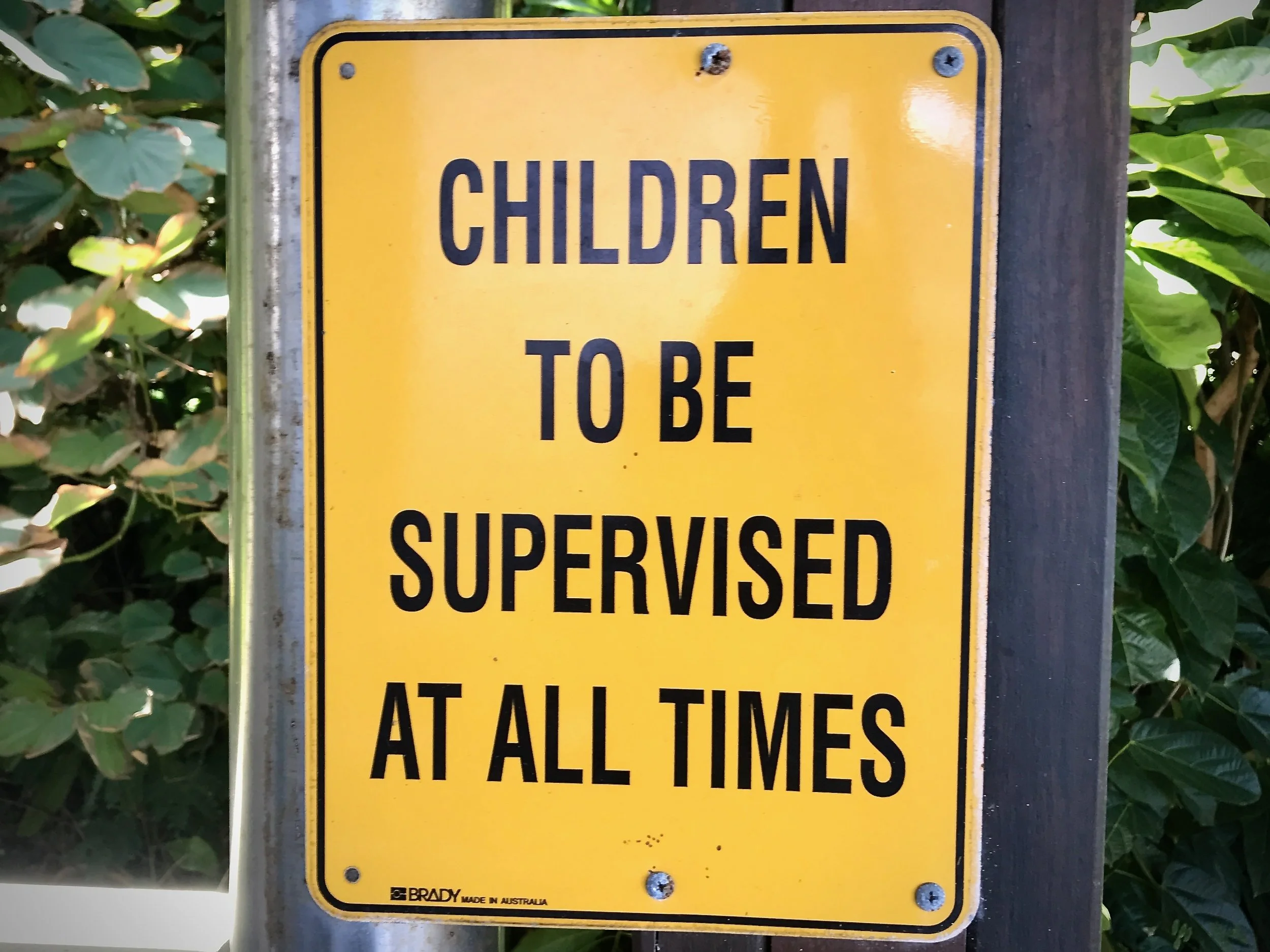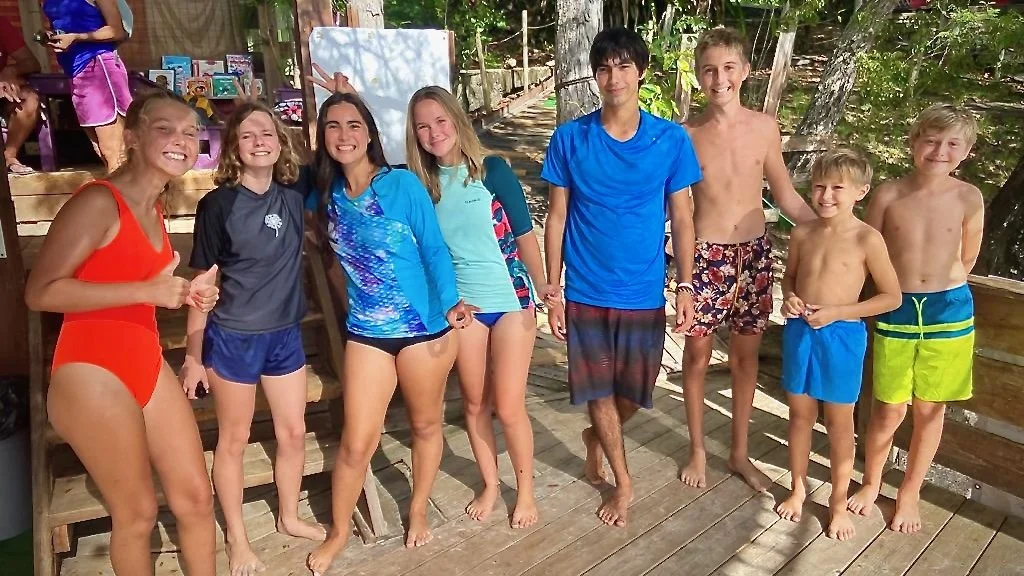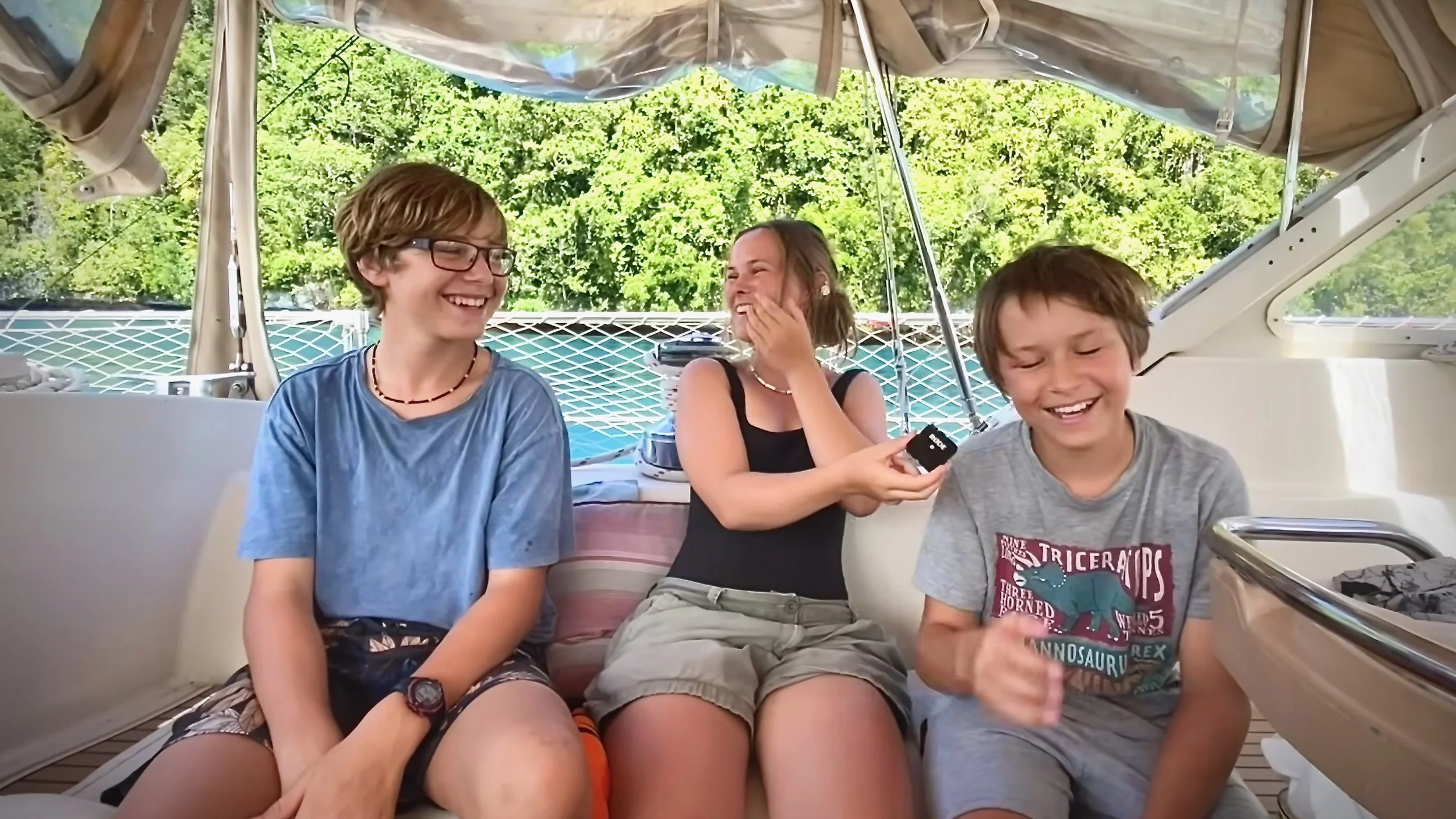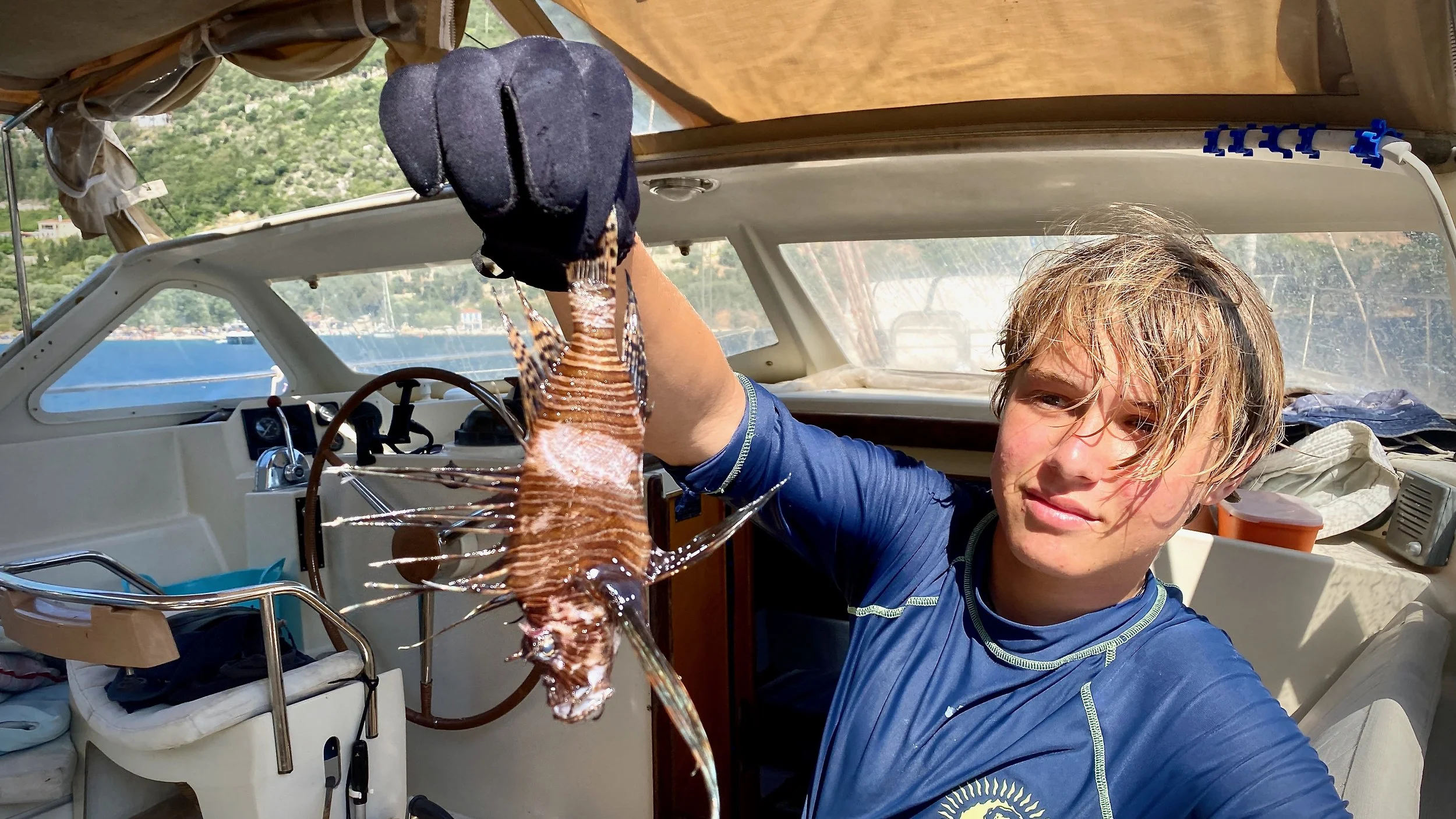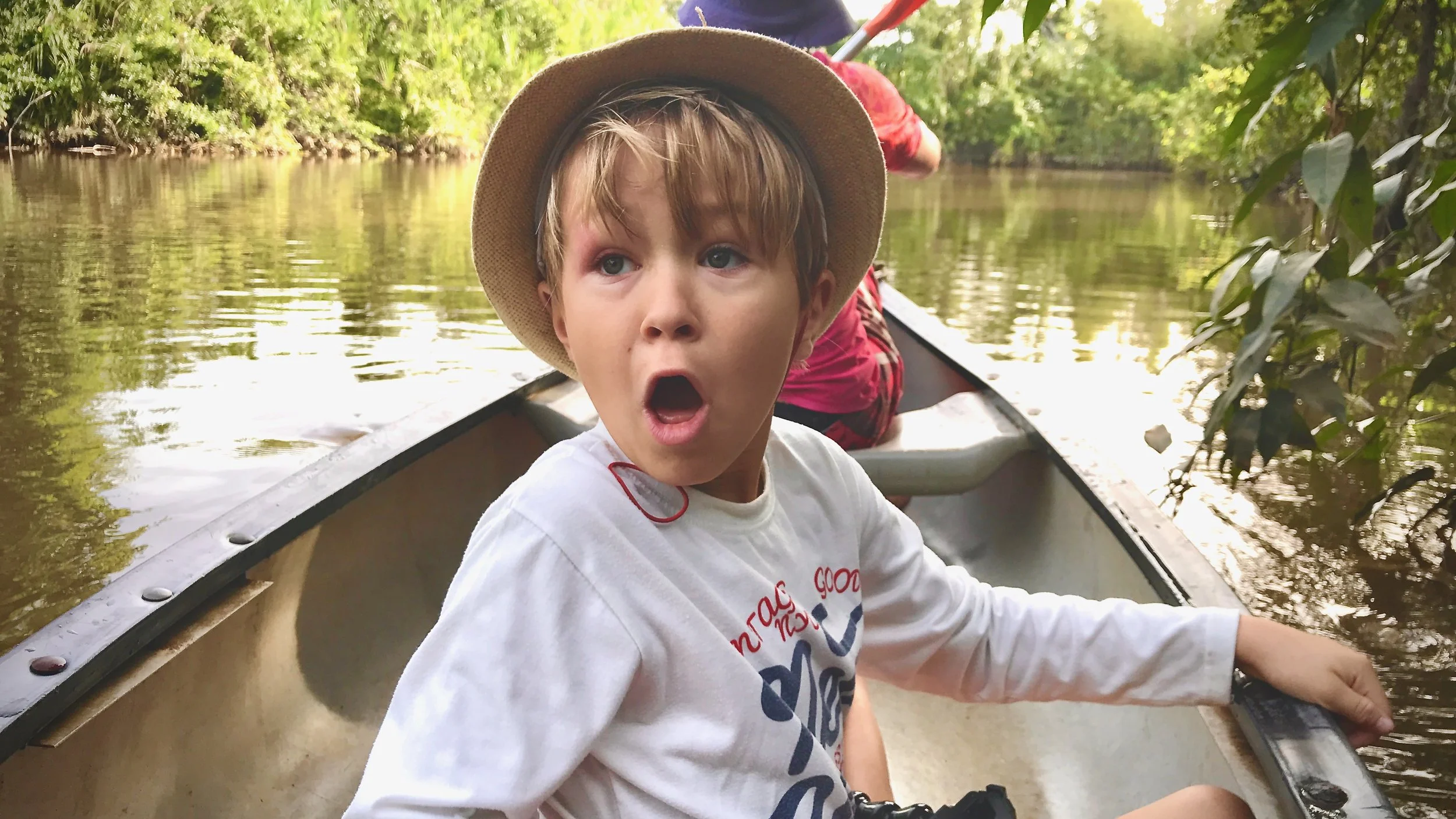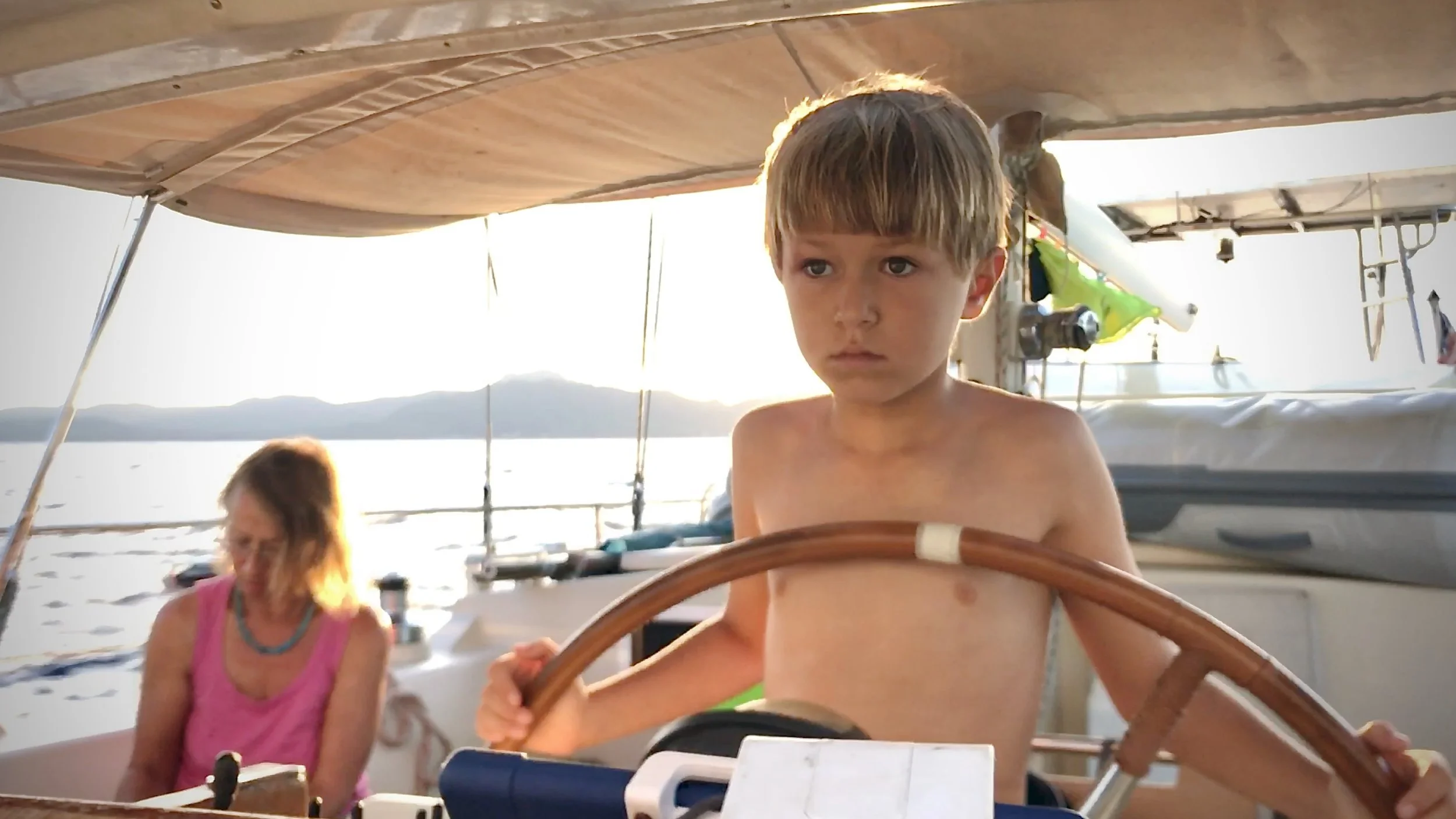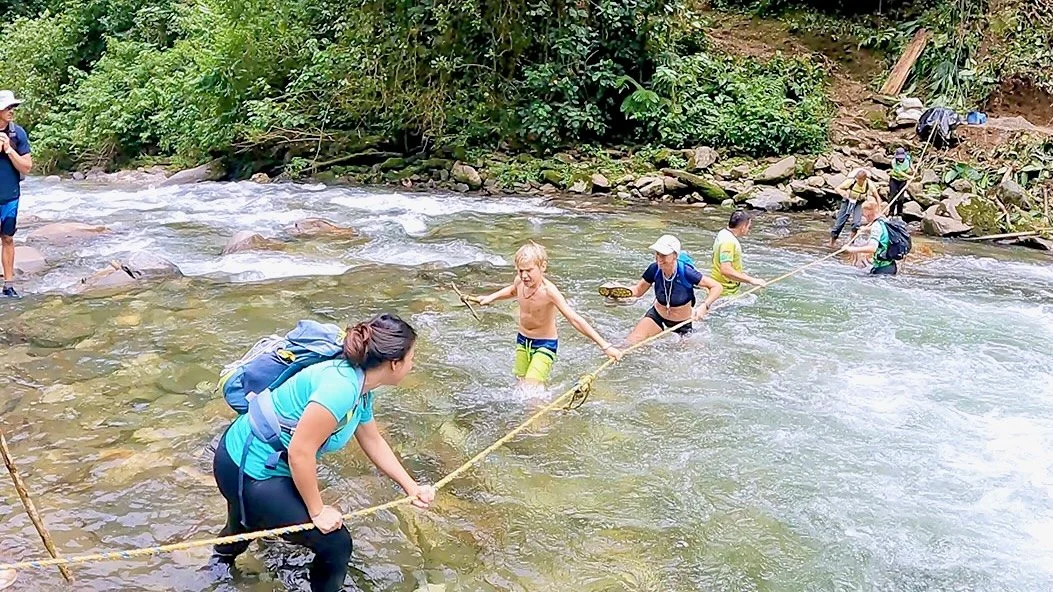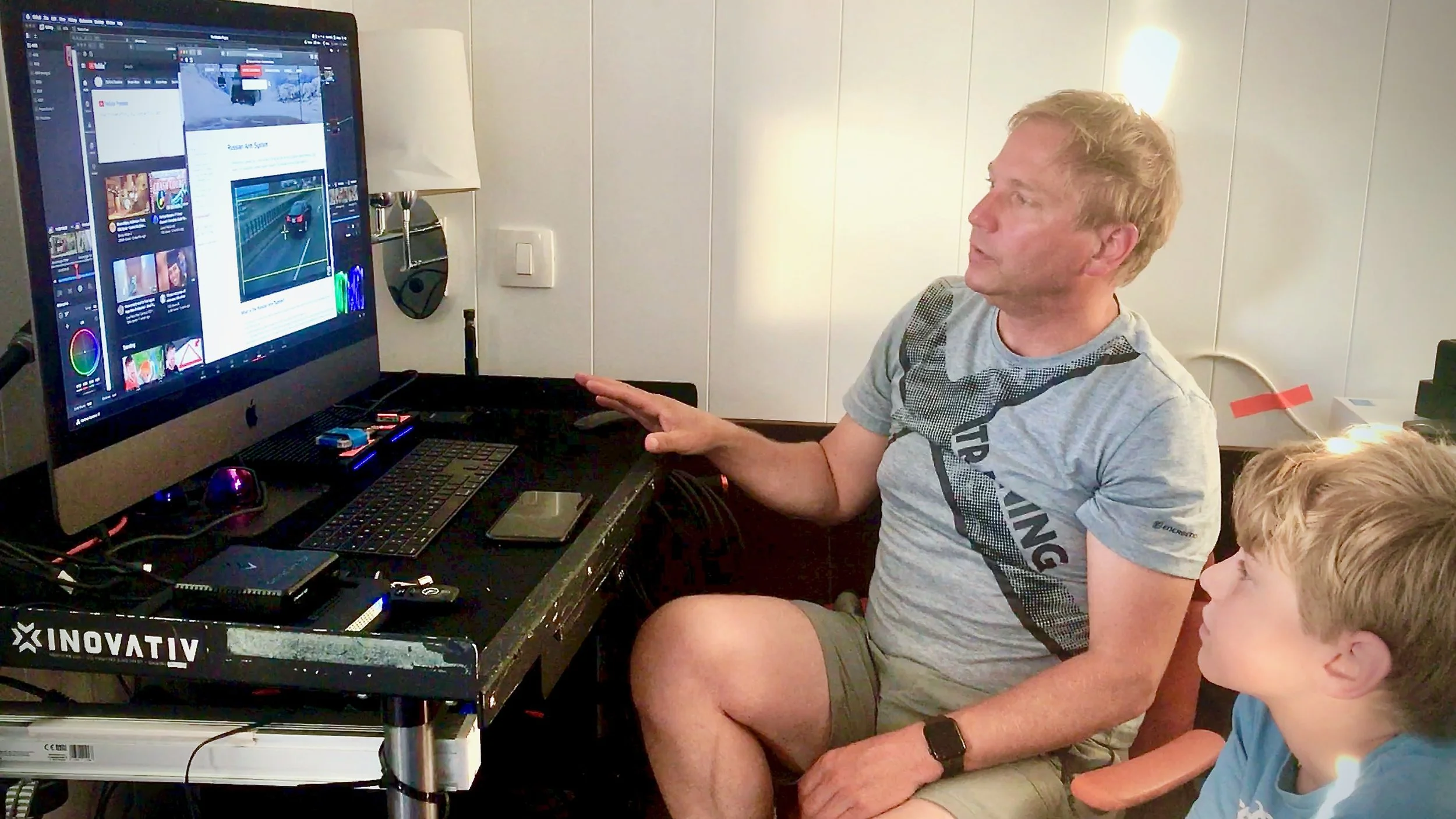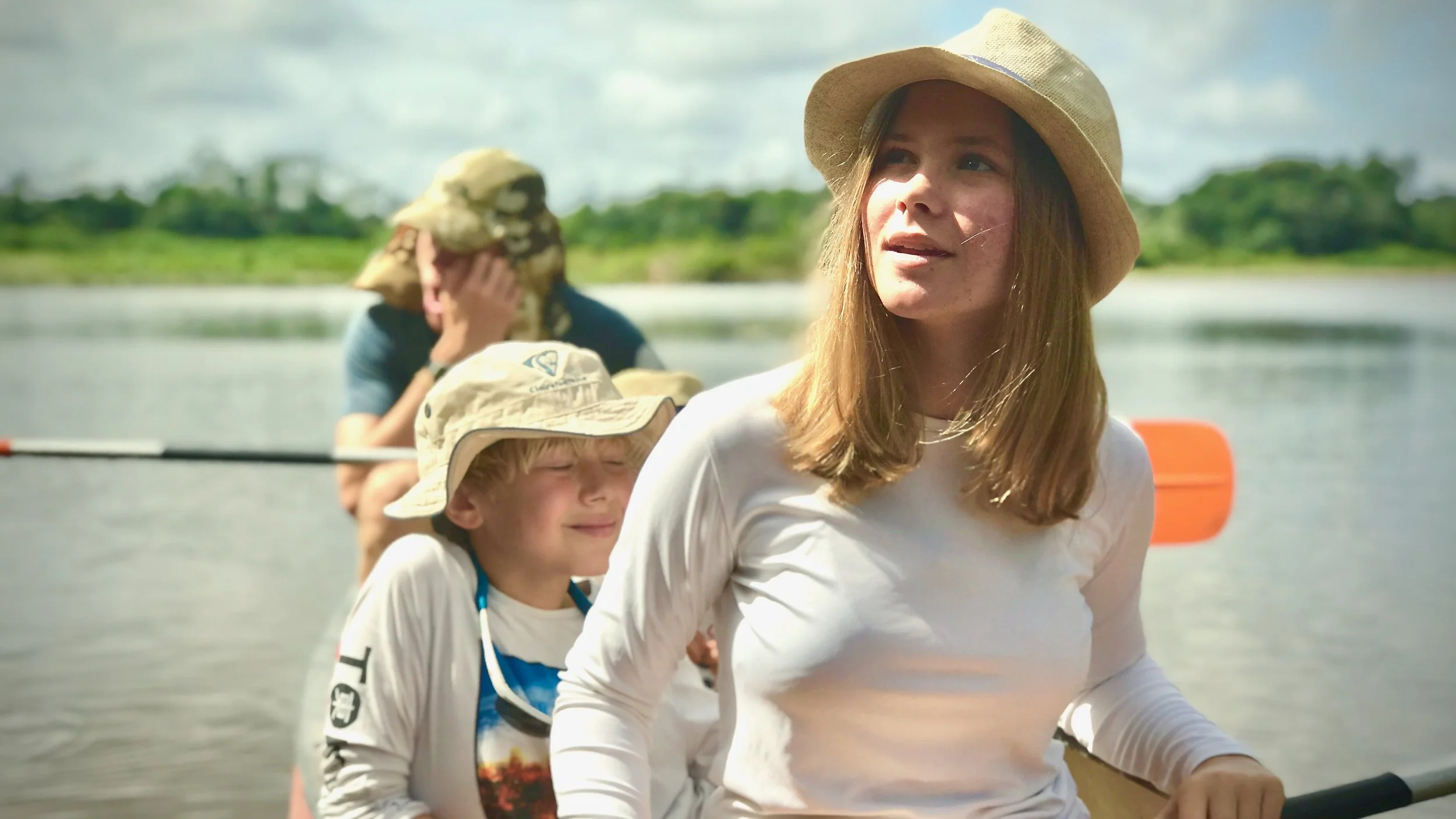Bringing up Kids on a Sailboat
01-04-13
“A ship in harbour is safe, but that is not what ships are built for.”
Darry and Yewan spotting something exciting in the sea onboard S/V Mothership
Back in My Day (Oh No, Here We Go!)
Kids used to be scruffy little lunatics, setting things on fire, vanishing for hours on bikes with dodgy brakes, and somehow making it home in one piece for tea. I remember once coming home in the dark after a particularly brutal and prolonged snowball fight, freezing cold and soaking wet. My mam had popped out for a chat and cup of tea with a neighbour, forgetting she’d locked me out. When she returned, I was curled up on the doorstep with borderline hypothermia and frost bite.
Frankly, I could probably have done with a spot of modern snowplough parenting, because looking back, my entire childhood seems to have been a long string of near-death experiences.
Bubble-Wrapped and Anxious
Contrast that with today’s world, where kids can swipe a screen before they can wipe their own arse. They’re permanently jacked into charging cables, one micro aggression from a full-blown anxiety issue. Seriously, despite the ubiquity of it all, the sight of a kid sat in a restaurant glued to a screen, barely able to handle a knife and fork, let alone hold a conversation, still sends me into a tailspin.
Is it entirely kids’ fault when helicopter parenting has created a bubble-wrapped generation? - Cairns, Australia
But is it entirely the kids’ fault? Schools, the very institutions meant to prepare kids for life, seem hell-bent on making them less resilient. They’ve replaced practical challenges with paperwork, rough-and-tumble with mindfulness colouring sheets, and turned failure into something that wins them a laminated participation award.
The Cult of Quiet and Clean
In Amsterdam recently, some residents complained about kids playing outdoors and making too much noise. The case even went to court. Imagine that. Children. Playing. Outdoors. Unsupervised. The horror. In the UK, thousands of signs forbid ball games across housing estates. Meanwhile, half the nation’s kids can’t even manage an hour of exercise a day.
Social psychologist Jonathan Haidt (who I’ve quoted more than a few times) points out that the rise in anxiety, depression, and helicopter parenting has created a generation so bubble-wrapped they need a trigger warning before you can even give them a stern look of disapproval for bringing their Ipad to the dinner table.
Enter the Soggy, Unlikely Alternative
This brings me to the radical, slightly damp, and highly impractical idea of raising kids on a sailboat.
Boat kids hanging out in Martinique
Boat kids don’t sit exams every term. They sit through storms, engine failures, and provisioning runs that require a five-mile round trip in an overloaded dinghy.
Top tip: Dinghy provisioning trips always have a habit of turning into unplanned expeditions, so keep a dry bag permanently packed with waterproofs, snacks, and a tenner!
Their classrooms are coral reefs and customs offices. Their textbooks include tide tables and the engine manual. Their physical education involves hauling anchors, spearfishing dinner, and hiking up active volcanoes.
Boat kids' physical education sometimes involves hiking up active volcanoes. - Vulcano, Sicily.
What Boat Kids Really Learn
Towards the end of our circumnavigation, somewhere in Indonesia, I interviewed our brood about life afloat.
What I got was a philosophical lecture on food scarcity, marine biology, and the relative dangers of stingrays versus semi-domesticated dogs. Turns out, they see maps not as countries, but as memories and friendships. Dugongs, turtles, and manta rays aren’t just wildlife, they’re part of the family photo album. Or probably Instagram account. Get with the times Grandad.
Yewan, our youngest, described coral reefs as a movie set. Darry said catching fish was about survival, not sport. He loves his protein! They spoke wistfully about cold, fresh milk, and if there were a black market for cheddar cheese or Fray Bentos pies, our kids would be knee-deep in it, running their own syndicate.
I interviewed our brood about life afloat - turns out, they see maps not as countries, but as memories and friendships. - Raja Ampat, Indonesia
Minimalism and Murder (Just Kidding. Mostly.)
As for toys? They brought piles when we left the UK. Within weeks they’d been ditched in favour of sticks, bugs and weird shaped pebbles. Their stuffed bear and our unofficial mascot - Joshua - watched the transformation unfolding from the corner of the boat like some solemn Pixar tragedy, especially after a traumatic incident at the laundry turned him an embarrassing shade of pink.
Instead of asking for more stuff, they ask for better flip-flops, sharper knives, and occasionally, an entire lamb shank when rations are scarce.
Kids learn best when they’re free to explore and play without constant adult supervision. Mostly. - Rainbow Reef, Fiji
Experts like Peter Gray and Richard Louv would be thrilled. Gray says kids learn best when they’re free to explore and play without constant adult supervision; exactly what happens when you let them loose on a beach in Vanuatu with a machete and a radio. Let kids carry proper tools, but teach safety early. They’ll rise to it if you set clear rules and trust them. Although I’m doubtful whether Gray and Louv ever read, “Lord of the Flies” by William Golding!
Louv coined “Nature Deficit Disorder” to describe how modern kids are cut off from the wild. Try telling that to kids who’ve been slapped by sea lions, chased by dogs and hand-fed sharks with lionfish they speared, de-spined and filleted themselves.
“Nature Deficit Disorder” describes how modern kids are cut off from the wild. Meanwhile boat kids catch, de-spine and eat lionfish who’s sting is described as that of a cobra bite. Ithica Island, Greece.
There is something authentic and terrifying about raising kids in an environment where consequences are real.
It's Not Always a Love Boat
But boat kids aren’t angels. If they don’t get involved, they get bored, and bored kids are a nightmare on boats. They bicker, sulk, and occasionally try to murder each other with filleting knives. I wish I were joking, but no.
There is something authentic and terrifying about raising kids in an environment where consequences are real. - Surname River, Suriname
They’re caffeinated squirrels in a fibreglass tube, and every deck fitting is a potential hospital visit (and has been on our boat). But when they’re part of the crew, not cargo, they become problem-solvers. Give them binoculars. Set them up on watch with hot chocolate and an audiobook. It’s these little hacks that make a world of difference. Suddenly, they’re free diving for lost keys on the seabed, scrubbing the hull and when the meat is low, they’re trying camel, crocodile, kangaroo and God forbid, Tofu. Tough little buggers that they are. Even Navy SEALs refuse to eat that sh*t!
Set them up on watch with hot chocolate and an audiobook and watch them thrive on the responsibility. - Somewhere between Venezuela and Colombia.
“What About Their Social Life?”
Like we’ve locked them in a broom cupboard with nothing but a sextant and a pack of Uno cards?
Seasonal family flotillas form organically. Boat kids are socially agile. In marinas and anchorages, they build rafts, form tribes, and trade stories like seasoned travellers. Meanwhile, we parents swap wine and war stories about boat repairs like it’s pound-shop Davos. Facebook groups help, but honestly, the grapevine and grape juice is faster.
Kids learn leadership, empathy, and crucially, how to shut up and keep walking when the going gets tough. - Ciudad Perdida Teyuna, Colombia
We once buddy-boated with four Mormon families through Central America. We’re not Mormon. We’re barely Sunday-compatible. And those maniacs don’t even drink English tea, never mind beer! I can’t even… Anyway, the kids gelled instantly.
By the time we were hiking through the Colombian jungle with 19 kids, it was clear: the tribe thing works. They learn leadership, empathy, and crucially, how to shut up and keep walking when the going gets tough. On that subject, if you post your plans early on family forums and kid boat groups, your kids will have mate dates before you even drop anchor.
Growing Up (and Online)
Let’s not pretend it’s still 1983. The internet isn’t going anywhere. The real question is: what kind of online presence do we want for our kids?
The internet offers kids an outlet to express more creativity, resilience, and problem-solving than a glossy CV ever could. Roman showing Darry how to edit on M/Y Robin Hood on the set of, "Wonders in Nature", Croatia.
Economist Mary Somerset-Webb said it best: don’t discourage screen time, steer it toward building an online brand. The late, great Ken Robinson echoed the sentiment: “We don’t grow into creativity. We grow out of it.” So let’s not waste it. That creativity deserves an outlet. Hand them iMovie or CapCut. Let them film the passage prep, the jungle hikes, the reef dives. It’s media literacy in disguise. Education, but with a backing track.
A kid making YouTube videos about sailing, marine biology, or bugs is learning storytelling, editing, and marketing. That’s not wasted time. It’s a job starter.
A kid making YouTube videos about their passion - such as bugs - is learning storytelling, editing, and marketing. That’s not wasted time. It’s a job starter.
Kids like these express more creativity, resilience, and problem-solving than a glossy CV ever could. They’re hackers and improvisers who already know how to filter water, solder a wire, and sweet-talk a customs official in Spanish. No syllabus required. And by the way its not a bad idea to get kids on Duolingo to handle basic port check-ins. Locals are often more patient with a kid learning than an adult flailing.
Not Perfect, But Real
Is it perfect? God, no. I’d be the first to admit that raising kids on a boat isn’t the romantic, fairytale that some Instagram accounts and Youtube channels would have you believe.
They miss friends, grandparents, and proper bacon. They dream of bubble baths, flushing toilets, and beds that don’t move. They get bored, seasick, sunburnt, and sometimes terrified.
But they’re gaining independence most kids won’t get until university, if ever.
Boat kids get bored, seasick, sunburnt, and sometimes terrified… but have a childhood like no other. - Amazon Jungle, Suriname
So no, raising kids on a boat won’t make them perfect. But in a world where childhood is increasingly confined, controlled, and commodified, it might just make them robust, resilient, and ready.
Ready to think, adapt, and busk in a foreign country for the cost of a giros or pancake at the local taverna. It’s real. it’s raw, and it gives them something many land kids are missing: purpose.
And if all else fails, they’ll have sea legs, a mean noodles recipe, and a better-than-average chance of surviving the zombie apocalypse.
And honestly, the way the world is going… that’s probably the best start in life you can give them.
If you want more straight-talking tales from life afloat, and information about bringing up kids on a sailboat, then you’ll love our upcoming book. We're inviting early readers to join the pre-launch crew and get behind-the-scenes access as we wrestle it into shape. It’s honest, unfiltered, and occasionally useful. Sign up here to get involved, give feedback, and be part of something that’ll either be a bestseller or a brilliant cautionary tale.
